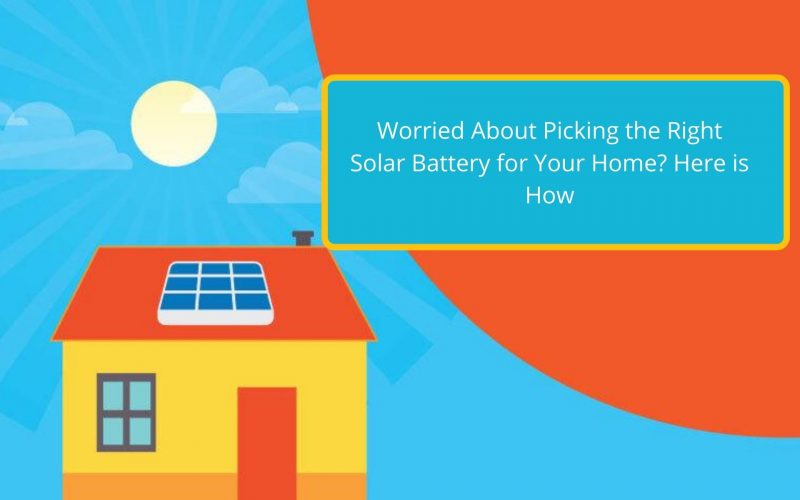Almost every battery has identical specifications, which makes it nearly impossible for any layman to choose the finest solar battery for their home. Not to worry because, by the end of this post, you’ll learn enough about solar batteries and their specifications to choose the best model that can power your home efficiently.
How to compare various solar batteries?
Before learning about the different types of solar batteries, let’s understand the essential points of comparison that you must keep in mind when choosing the optimum solar battery for your home.
Note: While the information aligned with these comparison metrics are centric to solar batteries, these can also be taken into consideration for choosing batteries for other purposes, for example, inverters.
Storage Capacity
Right off the bat, when choosing a battery, the first question that comes to mind is “What’s its storage capacity?”. Figuring out the amount of electricity (measured in kWh – Kilowatt-hours) a battery can store is simple: ask the seller or read the battery’s specifications.
But wait, what’s supposed to be the optimum storage capacity of solar batteries? As per a study by EIA, average household electricity consumption is 28.9 kWh per day (nearly 860 kWh month). Based on it, you can choose the battery.
Another way is to study your electricity bill. You can check the monthly bill and calculate the average amount of electricity that you consume. Accordingly, you can form a decision.
Power Output
You cannot purchase a battery solely on its storage capacity. You must check its power rating as well to determine how much electricity it can deliver at a given point of time. When choosing a battery, maintaining an equal balance between storage capacity and power output is crucial.
For example, if you purchase a battery with low storage capacity and high power rating, then you can power your home but only for a few hours. Similarly, if you invest in a battery with high storage capacity and low power rating, then it can deliver low kWh of electricity which can only be used to operate solar-powered appliances for a significant amount of time.
Battery Life & Warranty
Every type of battery goes through a cycle of charging and discharging daily, and they age accordingly. Solar batteries have an average lifespan of 10 to 15 years; however, it can vary based on your usage because a battery’s ability to hold a charge decreases with time. Simply put, in the initial phases, you can enjoy constant electricity flow, but over time you’ll start noticing that your battery is discharging quicker than usual.
To ensure you choose the right battery, focus on the warranty. The warranty cards guarantee the number of cycles throughout which a battery can deliver the stated electricity flow. Some of the warranties even mention the decrease in electricity flow after the mentioned cycles are over.
Round-trip Efficiency
Round-trip efficiency determines the economic value of the battery. It is a percentage that represents the amount of electricity that you can use compared to the amount spent on storing it.
Here’s an example for better understanding:
If it takes 100 kWh of electricity for a battery to charge and deliver 90 kWh, then its round-trip efficiency is 90%.
So, opting for batteries with higher or lower round-trip efficiency can affect the economic value that you generate through your chosen battery.
Depth of Discharge
DoD or Depth of Discharge signifies the amount of kWh that you can use from the total amount of kWh collected in the battery. If you use 100% of the collected kWh, then your battery’s lifespan will be reduced. Hence, optimum electricity consumption is specified through DoD.
For instance, if your battery has the capacity to store up to 100 kWh and you can use only 90 kWh, then the DoD will be 90%.
A 90% DoD is excellent for solar batteries. So, you must invest in batteries with higher DoD because it ensures more electricity and doesn’t harm the battery’s lifespan.
Battery Manufacturer
Manufactures matter. Both established brands and startups are producing solar batteries. While established brands have brand value, their cost is comparatively higher. In contrast, startups are providing affordable solar batteries, but at the expense of limited historical data to determine a battery’s functionality.
However, it depends majorly on the brand name and spending power. If you are someone who trusts and holds brand value in high regards, you can spend extensively on the batteries. In contrast, if you do not have high spending power, you might invest in buying batteries from startups.
Nevertheless, no matter what manufacturer you are buying the battery from, keep in mind to analyze the pointers mentioned-above to make an informed decision.
Have we missed anything? Let us know in the comments.
Do give our blog a read for all your solar-related questions. You can also check out other interesting updates on solar on our Facebook page (facebook.com/zunroof)
Reach out to us by filling the form below:

